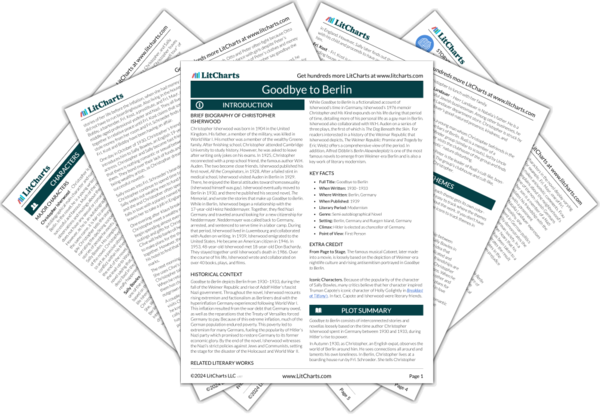The attitude of the characters in Goodbye to Berlin toward money emphasizes the insecure nature of the economy in 1930s Germany and shows the consequences that this insecurity had on the German political landscape. These consequences manifest in the behavior of individual characters in the book, who gravitate towards political extremism as a result of this instability. From the beginning of the novel, the German characters often reference the Inflation that followed World War I in Germany. After the war, the Treaty of Versailles bound Germany to pay significant reparations to other countries. This fact combined with Germany’s significant war debt meant that the German currency greatly inflated and much of the country was struck by poverty. For example, Frl. Schroeder, who used to be financially comfortable, is now forced to host boarders like Christopher. Additionally, one of Christopher’s students tells him a story of when his mother would allow a butcher to pinch and slap her in order to get meat for her children. The novel shows how widespread instability leads to political extremism. In fact, the Nazi party came to power by promising to restore Germany to its former, pre-War economic glory. Lothar Nowak, for example, is drawn from his family’s impoverished life to join a Nazi group. Whether it is fascist or communist, politics in the novel are extreme. This extremity spurned by poverty is mirrored on a personal level in the Nowak household. Their poor living conditions, a result of their poverty, not only make Frau Nowak physically ill but also cause the family to constantly fight. As the five of them (six, including Christopher) are confined to two rooms, they go mad living in such close proximity to one another.
Money as Security ThemeTracker

Money as Security Quotes in Goodbye to Berlin
“Somehow, when people have cash, you feel differently about them—I don’t know why.”
A Nazi journalist reminded his readers that tomorrow, the fourteenth of July, was a day of national rejoicing in France; and doubtless, he added, the French would rejoice with especial fervour this year, at the prospect of Germany’s downfall. Going into an outfitters, I bought myself a pair of ready-made flannel trousers for twelve marks fifty—a gesture of confidence by England.
“I don’t know what it is… You seem to have changed, somehow…”
“How have I changed?”
“It’s difficult to explain… You don’t seem to have any energy or want to get anywhere. You’re so dilletante. It annoys me.”
Seen thus, alone and off his guard, he seemed rather pathetic: he looked shabbier and far younger—a mere boy. I very nearly said: “He isn’t here.” But what would have been the use? They’d have got him anyway. “Yes, that’s him,” I told the detectives. “Over there.” They nodded. I turned and hurried away down the street, feeling guilty and telling myself: I’ll never help the police again.
“He’s going round to his Nazis, I suppose. I often wish he’d never taken up with them at all. They put all kinds of silly ideas in his head. It makes him so restless. Since he joined them he’s been a different boy altogether… Not that I understand these politics myself.”
“You see, Christoph… Peter hurt me very much. I thought he was my friend. And then, suddenly, he left me—all alone…”
The whole neighborhood owed [the Jewish tailor] money. Yet he was not unpopular: he enjoyed the status of a public character, whom people curse without real malice. “Perhaps Lothar’s right,” Frau Nowak would sometimes say: “When Hitler comes, he’ll show these Jews a thing or two. They won’t be so cheeky then.” But when I suggested that Hitler, if he got his own way, would remove the tailor altogether, then Frau Nowak would immediately change her tone: “Oh, I shouldn’t like that to happen. After all, he makes very good clothes. Besides, a Jew will always let you have time if you’re in difficulties. You wouldn’t catch a Christian giving credit like he does… You ask the people round here, Herr Christoph: they’d never turn on the Jews.”
“I await always that the worst will come. I know how things are in Germany today, and suddenly it can be that my father lose all. You know, that is happened once already? Before the War, my father has had a big factory in Posen. The War comes, and my father has to go. Tomorrow, it can be here the same.”
Last night, Fritz Wendel proposed a tour of the “dives.” It was to in the nature of a farewell visit, for the Police have begun to take a great interest in these places. They are frequently raided, and the names of their clients are written down. There is even talk of a general Berlin clean-up.











